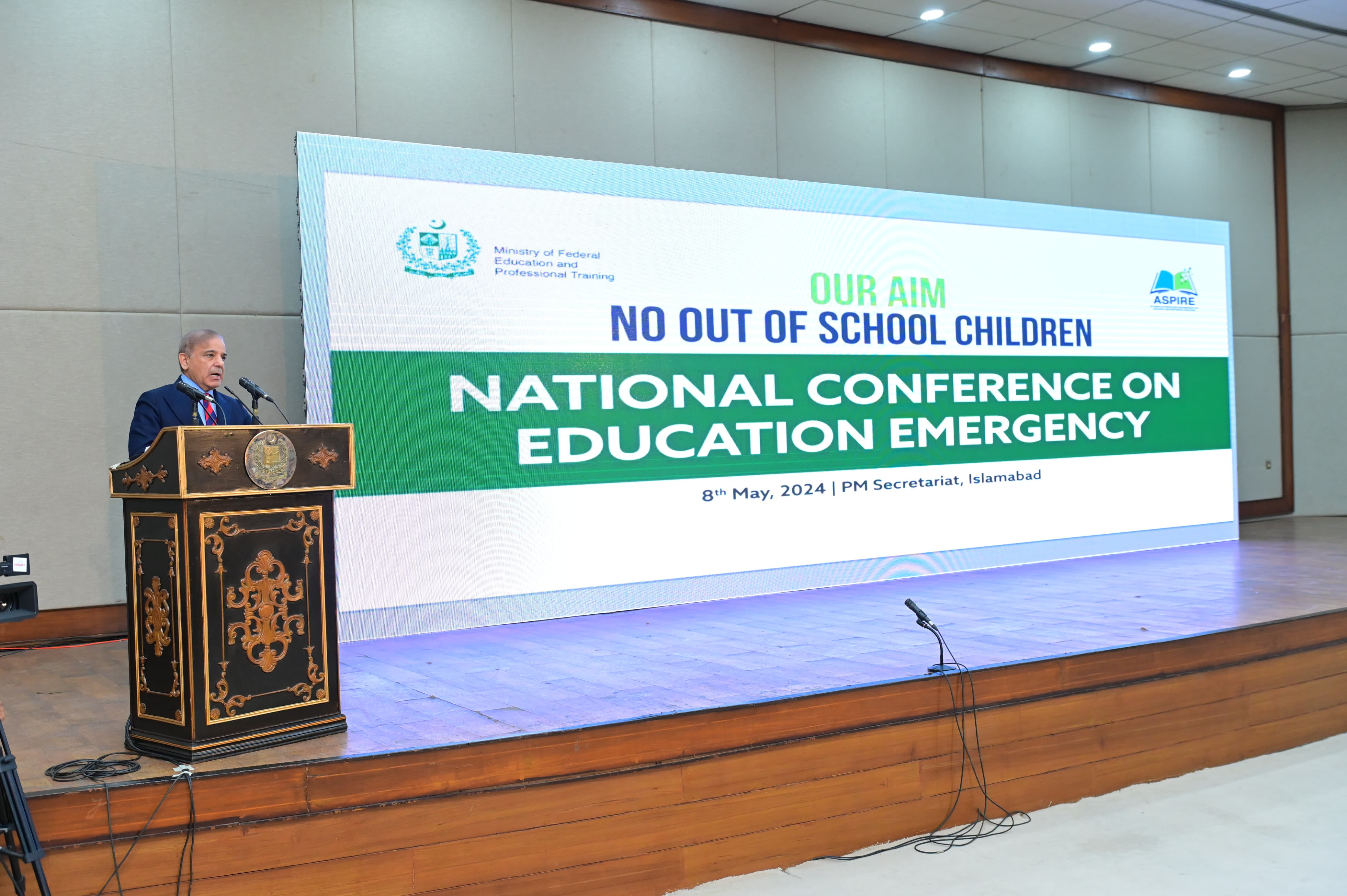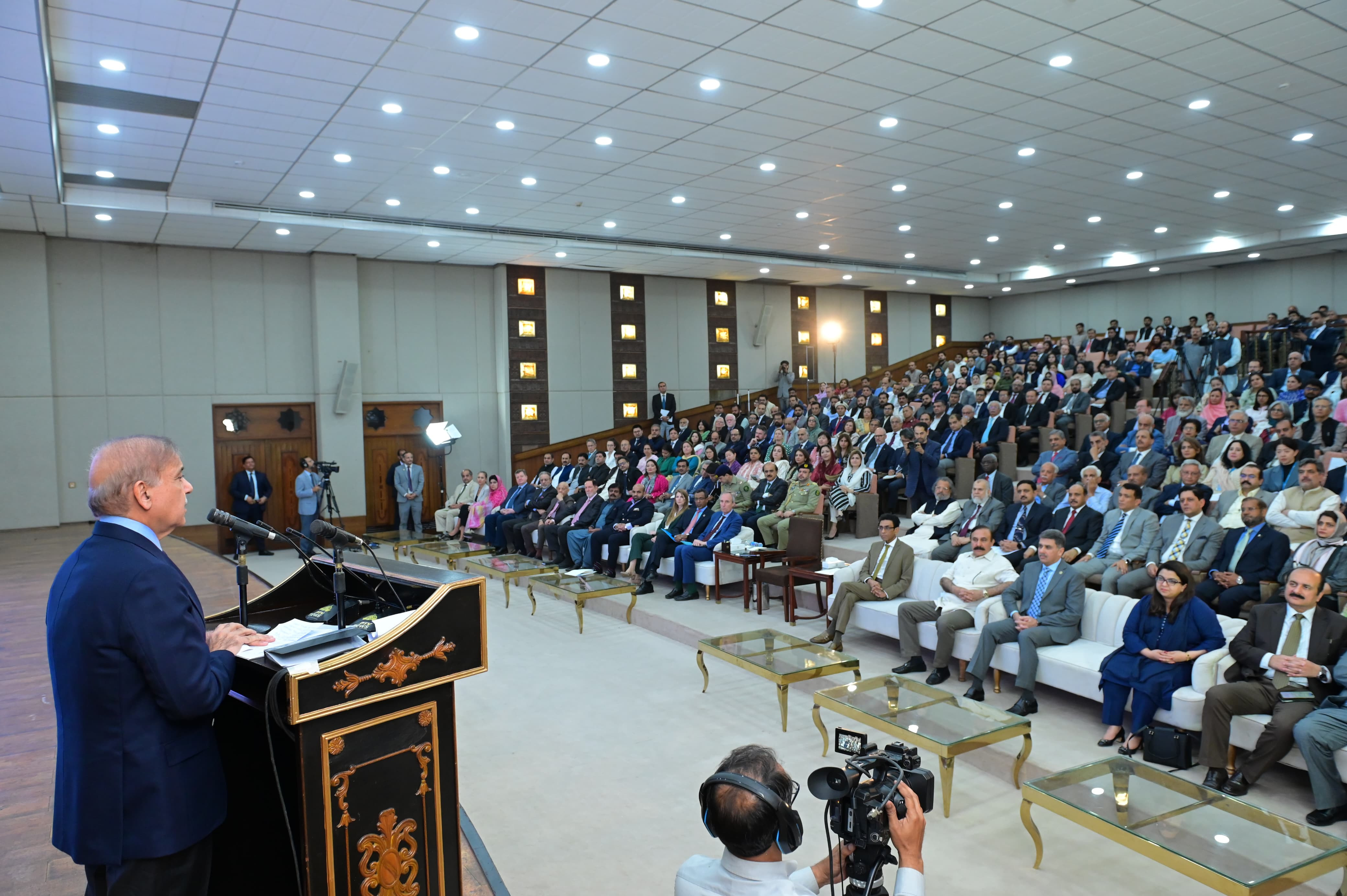- As we did in Punjab, we will replicate it across Pakistan, PM says at National Conference on Education Emergency
- Expresses hope Pakistan will be one of most educated societies despite challenges
ISLAMABAD: Prime Minister Shehbaz Sharif on Wednesday announced an “education emergency” across the country to enrol around 26 million out-of-school children and promote literacy to develop it as one of the most educated societies in the world.
“Today, with firm conviction and the support of provinces, we will address the challenge of 26 million out-of-school children. We will bring them back to school. I declare an education emergency throughout Pakistan from this moment onwards. As we did in Punjab, we will replicate it across Pakistan,” the prime minister said, addressing the National Conference on Education Emergency.
He informed the gathering of federal ministers, parliamentarians, vice-chancellors, diplomats, and development partners that he would personally oversee the programme, meeting with all chief ministers regardless of political affiliations, with the vision to march forward together, expressing hope that the provinces would also lend their support.
“This concerns our children and our future… This is undeniably a daunting task. However, nations that have faced challenges and setbacks in the past have risen from adversity. Germany and Japan are prime examples. Why not Pakistan? I assure you, if we unite to reclaim our position, Pakistan will emerge as one of the most educated societies,” he remarked.

The prime minister, recounting the achievements of the Punjab government during his tenure as chief minister, highlighted the increased enrolment rates, particularly for girls, through initiatives like the Zevar Taleem Programme, and the rescue of 90,000 boys from brick kilns to enrol them in schools.
He also mentioned the outsourcing of 10,000 poorly performing schools to improve educational quality and the establishment of Daanish Schools, which offered free high-quality education and boarding for underprivileged children.
He said that the Punjab Education Endowment Fund provided scholarships to hundreds of thousands of deserving students based on merit.
The prime minister stated that the enrolment of 26 million out-of-school children and addressing stunted growth were major challenges facing Pakistan, requiring significant financial resources. “But the real challenge lies in the determination to act,” he commented, recalling Islamabad’s commitment to becoming a nuclear power despite international pressure, and the elimination of terrorism by sacrificing around 80,000 lives to establish peace in the country and globally.

In his address, Minister for Federal Education and Professional Training Dr Khalid Maqbool Siddiqui said that the education sector required immediate action and urgent responses as Pakistan stood at a critical juncture with no room for failure. “The education statistics in Pakistan are concerning, alarming, and disheartening. More than 26 million children are out of school. This number exceeds the population of 150 countries worldwide,” he remarked.
UNICEF representative in Pakistan Abdullah A. Fadil stated that over 70 per cent of 10-year-old children in Pakistan could not read or comprehend text. Despite constitutional guarantees, education in Pakistan was neither compulsory nor free, he added.
He emphasised that through increased investment in education and young people, Pakistan could regain its former standing, highlighting that the country boasted the first Nobel Laureate in Physics and had recently launched a space mission to the moon.
British High Commissioner in Islamabad Jane Marriott noted that with 60 per cent of the population under 30 years of age, Pakistan was at a crucial juncture, facing tough decisions.
She stated that the conference called for urgent measures such as increased funding, inclusivity, multiple shifts in schools, and retention of children, assuring her country’s full cooperation in achieving these goals.
World Food Programme Country Director Coco Ushiyama, in her video message, emphasised that food security and education were intertwined, with school meals being one of the best programmes to invest in the country’s future.
World Bank Vice President Martin Raiser noted that Pakistan faced the challenge of 40 per cent of children experiencing stunted growth, rising to around 60 per cent in poor districts.
He commended the prime minister for taking on the challenge of out-of-school children and suggested that the government hold absent teachers accountable, and provide public transport, safe roads, toilets, and electricity in schools to enhance enrolment.
He stressed that since Pakistan’s education system was vulnerable to climate change, investing in climate resilience was imperative.
Pakistan’s fastest mountaineer Naila Kiani, in her video message from Makalu Mountain, attributed her success to self-belief and education. She urged the prime minister and chief ministers to allocate more resources for girls’ education to help them realise their dreams.























